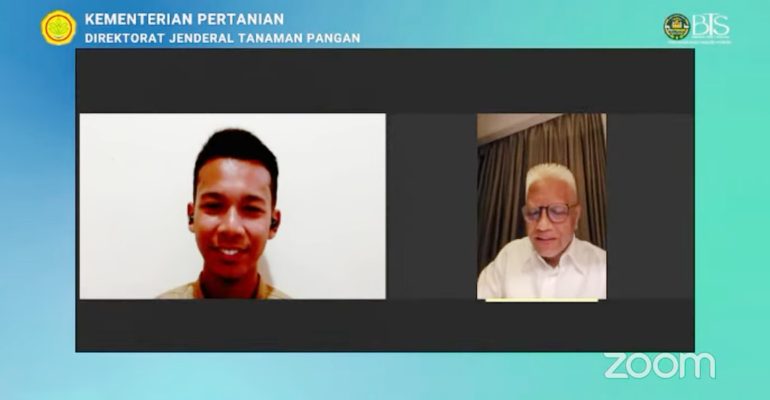IPB University Students Contribute Ideas in Propaktani Episode 35

The Directorate General of Food Crops, Ministry of Agriculture of the Republic of Indonesia, together with the Masyarakat Singkong Indonesia (Indonesian Cassava Society), held the 35th episode of the National Propaktani Webinar. This event also collaborated with the Executive Board of Students-Family of Students (BEM KM) of IPB University.
This episode of Propaktani focuses on the theme of the Urgency of Cassava Development as a National Strategic Commodity for Food, Feed, and Bioindustry. The webinar was attended by no fewer than 250 participants.
Latif Hidayatul Ikhsan, the Minister Coordinator for Community Service of BEM KM at IPB University, was present and shared his ideas. He mentioned that as an academician and a young generation, he is very interested in further researching cassava. He is also enthusiastic about playing a role in the downstream processing of Indonesian agriculture, including cassava commodities.
“Perhaps it is not visible at the moment, but behind the many benefits of cassava, which is easily cultivated, in the future, insyaallah Indonesian cassava will be able to progress,” he emphasized.
The Director General of Food Crops, Ministry of Agriculture of the Republic of Indonesia Dr Suwandi and Ir Arifin Lambaga as the Chairman of the Indonesian Cassava Society, were present and emphasized the importance of concerns regarding food other than rice. In this case, one of them is to delve deeper into cassava.
This program aims to maximize the potential of cassava, which is currently receiving less attention. By providing insights and opportunities for cassava in the future, it is not impossible for Indonesia to become the ‘cassava king’ again.
“I highly appreciate and support the improvement of the potential of cassava. Certainly, with the current innovations that must continue to be developed, don’t forget that biosaka innovations can also be collaborated in the future,” said Dr Suwandi.
He also emphasized the importance of promoting food diversification. “We know that Lampung is a cassava producer, but the people do not consume cassava as their source of carbohydrates,” he explained.
So far, he mentioned that the eastern regions have made cassava a staple food. According to him, the potential in the region can be maximized and utilized.
“Do not rely too much on eating only rice, there are still many sources of carbohydrate substitutes for rice, such as sago, sorghum, and cassava. I believe that the Indonesian Cassava Society has made many improvements in production from upstream to downstream, and of course, we must support and continue to increase it,” said Dr Suwandi.
Meanwhile, Ir Arifin Lambaga stated that cassava can produce 40-60 tons per hectare. Compared to rice, it is significantly higher. Therefore, he emphasized the need for young generations and all parties to innovate and develop Indonesian cassava.
“In the 1900s, Indonesia was a cassava center, but now it is dominated by Vietnam. Therefore, let us restore the glory of Indonesian cassava to the world,” he concluded. (*/Rz) (IAAS/DSR)



